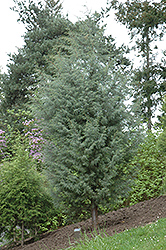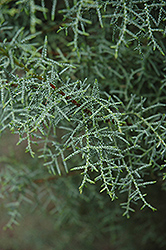It's all about ...
plants

Height: 50 feet
Spread: 15 feet
Sunlight:
![]()
Hardiness Zone: 8b
Other Names: Bhutan Cypress
Description:
A tall pyramidal tree with lovely fine foliage that may be slightly pendulous at the tips; the base of the tree may become more rounded with age; ideal as a formal specimen or screen
Ornamental Features
Himalayan Cypress is primarily valued in the landscape for its distinctively pyramidal habit of growth. It has attractive dark green evergreen foliage. The scale-like sprays of foliage are highly ornamental and remain dark green throughout the winter.
Landscape Attributes
Himalayan Cypress is an open evergreen tree with a strong central leader and a distinctive and refined pyramidal form. It lends an extremely fine and delicate texture to the landscape composition which can make it a great accent feature on this basis alone.
This is a relatively low maintenance tree, and should not require much pruning, except when necessary, such as to remove dieback. It has no significant negative characteristics.
Himalayan Cypress is recommended for the following landscape applications;
- Accent
- Vertical Accent
- Hedges/Screening
- Windbreaks and Shelterbelts
Planting & Growing
Himalayan Cypress will grow to be about 50 feet tall at maturity, with a spread of 15 feet. It has a low canopy with a typical clearance of 1 foot from the ground, and should not be planted underneath power lines. It grows at a medium rate, and under ideal conditions can be expected to live for 60 years or more.
This tree should only be grown in full sunlight. It prefers dry to average moisture levels with very well-drained soil, and will often die in standing water. It is not particular as to soil pH, but grows best in sandy soils. It is somewhat tolerant of urban pollution. This species is not originally from North America.
This plant is not reliably hardy in our region, and certain restrictions may apply; contact the store for more information.

